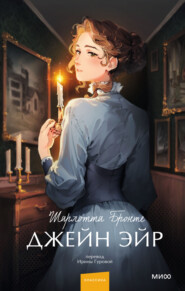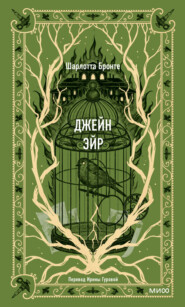По всем вопросам обращайтесь на: info@litportal.ru
(©) 2003-2024.
✖
Shirley
Настройки чтения
Размер шрифта
Высота строк
Поля
“I am quite well,” she said briefly.
“Yet changed.”
“That matters to none but myself. We all change.”
“Will you sit down? Formerly, Miss Keeldar, I had some influence with you: have I any now? May I feel that what I am saying is not accounted positive presumption?”
“Let me read some French, Mr. Moore, or I will even take a spell at the Latin grammar, and let us proclaim a truce to all sanitary discussions.”
“No, no. It is time there were discussions.”
“Discuss away, then, but do not choose me for your text. I am a healthy subject.”
“Do you not think it wrong to affirm and reaffirm what is substantially untrue?”
“I say I am well. I have neither cough, pain, nor fever.”
“Is there no equivocation in that assertion? Is it the direct truth?”
“The direct truth.”
Louis Moore looked at her earnestly.
“I can myself,” he said, “trace no indications of actual disease. But why, then, are you altered?”
“Am I altered?”
“We will try. We will seek a proof.”
“How?”
“I ask, in the first place, do you sleep as you used to?”
“I do not; but it is not because I am ill.”
“Have you the appetite you once had?”
“No; but it is not because I am ill.”
“You remember this little ring fastened to my watch-chain? It was my mother’s, and is too small to pass the joint of my little finger. You have many a time sportively purloined it. It fitted your forefinger. Try now.”
She permitted the test. The ring dropped from the wasted little hand. Louis picked it up, and reattached it to the chain. An uneasy flush coloured his brow. Shirley again said, “It is not because I am ill.”
“Not only have you lost sleep, appetite, and flesh,” proceeded Moore, “but your spirits are always at ebb. Besides, there is a nervous alarm in your eye, a nervous disquiet in your manner. These peculiarities were not formerly yours.”
“Mr. Moore, we will pause here. You have exactly hit it. I am nervous. Now, talk of something else. What wet weather we have – steady, pouring rain!”
“You nervous? Yes; and if Miss Keeldar is nervous, it is not without a cause. Let me reach it. Let me look nearer. The ailment is not physical. I have suspected that. It came in one moment. I know the day. I noticed the change. Your pain is mental.”
“Not at all. It is nothing so dignified – merely nervous. Oh! dismiss the topic.”
“When it is exhausted; not till then. Nervous alarms should always be communicated, that they may be dissipated. I wish I had the gift of persuasion, and could incline you to speak willingly. I believe confession, in your case, would be half equivalent to cure.”
“No,” said Shirley abruptly. “I wish that were at all probable; but I am afraid it is not.”
She suspended her work a moment. She was now seated. Resting her elbow on the table, she leaned her head on her hand. Mr. Moore looked as if he felt he had at last gained some footing in this difficult path. She was serious, and in her wish was implied an important admission; after that she could no longer affirm that nothing ailed her.
The tutor allowed her some minutes for repose and reflection ere he returned to the charge. Once his lips moved to speak, but he thought better of it, and prolonged the pause. Shirley lifted her eye to his. Had he betrayed injudicious emotion, perhaps obstinate persistence in silence would have been the result; but he looked calm, strong, trustworthy.
“I had better tell you than my aunt,” she said, “or than my cousins, or my uncle. They would all make such a bustle, and it is that very bustle I dread – the alarm, the flurry, the éclat. In short, I never liked to be the centre of a small domestic whirlpool. You can bear a little shock – eh?”
“A great one, if necessary.”
Not a muscle of the man’s frame moved, and yet his large heart beat fast in his deep chest. What was she going to tell him? Was irremediable mischief done?
“Had I thought it right to go to you, I would never have made a secret of the matter one moment,” she continued. “I would have told you at once, and asked advice.”
“Why was it not right to come to me?”
“It might be right – I do not mean that; but I could not do it. I seemed to have no title to trouble you. The mishap concerned me only. I wanted to keep it to myself, and people will not let me. I tell you, I hate to be an object of worrying attention, or a theme for village gossip. Besides, it may pass away without result – God knows!”
Moore, though tortured with suspense, did not demand a quick explanation. He suffered neither gesture, glance, nor word to betray impatience. His tranquillity tranquillized Shirley; his confidence reassured her.
“Great effects may spring from trivial causes,” she remarked, as she loosened a bracelet from her wrist. Then, unfastening her sleeve, and partially turning it up, “Look here, Mr. Moore.”
She showed a mark in her white arm – rather a deep though healed-up indentation – something between a burn and a cut.
“I would not show that to anyone in Briarfield but you, because you can take it quietly.”
“Certainly there is nothing in the little mark to shock. Its history will explain.”
“Small as it is, it has taken my sleep away, and made me nervous, thin, and foolish; because, on account of that little mark, I am obliged to look forward to a possibility that has its terrors.”
The sleeve was readjusted, the bracelet replaced.
“Do you know that you try me?” he said, smiling. “I am a patient sort of man, but my pulse is quickening.”
“Whatever happens, you will befriend me, Mr. Moore? You will give me the benefit of your self-possession, and not leave me at the mercy of agitated cowards?”
“I make no promise now. Tell me the tale, and then exact what pledge you will.”
“It is a very short tale. I took a walk with Isabella and Gertrude one day, about three weeks ago. They reached home before me; I stayed behind to speak to John. After leaving him, I pleased myself with lingering in the lane, where all was very still and shady. I was tired of chattering to the girls, and in no hurry to rejoin them. As I stood leaning against the gate pillar, thinking some very happy thoughts about my future life – for that morning I imagined that events were beginning to turn as I had long wished them to turn.”
“Ah! Nunnely had been with her the evening before!” thought Moore parenthetically.
“I heard a panting sound; a dog came running up the lane. I know most of the dogs in this neighbourhood. It was Phoebe, one of Mr. Sam Wynne’s pointers. The poor creature ran with her head down, her tongue hanging out; she looked as if bruised and beaten all over. I called her. I meant to coax her into the house and give her some water and dinner. I felt sure she had been ill-used. Mr. Sam often flogs his pointers cruelly. She was too flurried to know me; and when I attempted to pat her head, she turned and snatched at my arm. She bit it so as to draw blood, then ran panting on. Directly after, Mr. Wynne’s keeper came up, carrying a gun. He asked if I had seen a dog. I told him I had seen Phoebe.
“‘You had better chain up Tartar, ma’am,’ he said, ‘and tell your people to keep within the house. I am after Phoebe to shoot her, and the groom is gone another way. She is raging mad.’”
“Yet changed.”
“That matters to none but myself. We all change.”
“Will you sit down? Formerly, Miss Keeldar, I had some influence with you: have I any now? May I feel that what I am saying is not accounted positive presumption?”
“Let me read some French, Mr. Moore, or I will even take a spell at the Latin grammar, and let us proclaim a truce to all sanitary discussions.”
“No, no. It is time there were discussions.”
“Discuss away, then, but do not choose me for your text. I am a healthy subject.”
“Do you not think it wrong to affirm and reaffirm what is substantially untrue?”
“I say I am well. I have neither cough, pain, nor fever.”
“Is there no equivocation in that assertion? Is it the direct truth?”
“The direct truth.”
Louis Moore looked at her earnestly.
“I can myself,” he said, “trace no indications of actual disease. But why, then, are you altered?”
“Am I altered?”
“We will try. We will seek a proof.”
“How?”
“I ask, in the first place, do you sleep as you used to?”
“I do not; but it is not because I am ill.”
“Have you the appetite you once had?”
“No; but it is not because I am ill.”
“You remember this little ring fastened to my watch-chain? It was my mother’s, and is too small to pass the joint of my little finger. You have many a time sportively purloined it. It fitted your forefinger. Try now.”
She permitted the test. The ring dropped from the wasted little hand. Louis picked it up, and reattached it to the chain. An uneasy flush coloured his brow. Shirley again said, “It is not because I am ill.”
“Not only have you lost sleep, appetite, and flesh,” proceeded Moore, “but your spirits are always at ebb. Besides, there is a nervous alarm in your eye, a nervous disquiet in your manner. These peculiarities were not formerly yours.”
“Mr. Moore, we will pause here. You have exactly hit it. I am nervous. Now, talk of something else. What wet weather we have – steady, pouring rain!”
“You nervous? Yes; and if Miss Keeldar is nervous, it is not without a cause. Let me reach it. Let me look nearer. The ailment is not physical. I have suspected that. It came in one moment. I know the day. I noticed the change. Your pain is mental.”
“Not at all. It is nothing so dignified – merely nervous. Oh! dismiss the topic.”
“When it is exhausted; not till then. Nervous alarms should always be communicated, that they may be dissipated. I wish I had the gift of persuasion, and could incline you to speak willingly. I believe confession, in your case, would be half equivalent to cure.”
“No,” said Shirley abruptly. “I wish that were at all probable; but I am afraid it is not.”
She suspended her work a moment. She was now seated. Resting her elbow on the table, she leaned her head on her hand. Mr. Moore looked as if he felt he had at last gained some footing in this difficult path. She was serious, and in her wish was implied an important admission; after that she could no longer affirm that nothing ailed her.
The tutor allowed her some minutes for repose and reflection ere he returned to the charge. Once his lips moved to speak, but he thought better of it, and prolonged the pause. Shirley lifted her eye to his. Had he betrayed injudicious emotion, perhaps obstinate persistence in silence would have been the result; but he looked calm, strong, trustworthy.
“I had better tell you than my aunt,” she said, “or than my cousins, or my uncle. They would all make such a bustle, and it is that very bustle I dread – the alarm, the flurry, the éclat. In short, I never liked to be the centre of a small domestic whirlpool. You can bear a little shock – eh?”
“A great one, if necessary.”
Not a muscle of the man’s frame moved, and yet his large heart beat fast in his deep chest. What was she going to tell him? Was irremediable mischief done?
“Had I thought it right to go to you, I would never have made a secret of the matter one moment,” she continued. “I would have told you at once, and asked advice.”
“Why was it not right to come to me?”
“It might be right – I do not mean that; but I could not do it. I seemed to have no title to trouble you. The mishap concerned me only. I wanted to keep it to myself, and people will not let me. I tell you, I hate to be an object of worrying attention, or a theme for village gossip. Besides, it may pass away without result – God knows!”
Moore, though tortured with suspense, did not demand a quick explanation. He suffered neither gesture, glance, nor word to betray impatience. His tranquillity tranquillized Shirley; his confidence reassured her.
“Great effects may spring from trivial causes,” she remarked, as she loosened a bracelet from her wrist. Then, unfastening her sleeve, and partially turning it up, “Look here, Mr. Moore.”
She showed a mark in her white arm – rather a deep though healed-up indentation – something between a burn and a cut.
“I would not show that to anyone in Briarfield but you, because you can take it quietly.”
“Certainly there is nothing in the little mark to shock. Its history will explain.”
“Small as it is, it has taken my sleep away, and made me nervous, thin, and foolish; because, on account of that little mark, I am obliged to look forward to a possibility that has its terrors.”
The sleeve was readjusted, the bracelet replaced.
“Do you know that you try me?” he said, smiling. “I am a patient sort of man, but my pulse is quickening.”
“Whatever happens, you will befriend me, Mr. Moore? You will give me the benefit of your self-possession, and not leave me at the mercy of agitated cowards?”
“I make no promise now. Tell me the tale, and then exact what pledge you will.”
“It is a very short tale. I took a walk with Isabella and Gertrude one day, about three weeks ago. They reached home before me; I stayed behind to speak to John. After leaving him, I pleased myself with lingering in the lane, where all was very still and shady. I was tired of chattering to the girls, and in no hurry to rejoin them. As I stood leaning against the gate pillar, thinking some very happy thoughts about my future life – for that morning I imagined that events were beginning to turn as I had long wished them to turn.”
“Ah! Nunnely had been with her the evening before!” thought Moore parenthetically.
“I heard a panting sound; a dog came running up the lane. I know most of the dogs in this neighbourhood. It was Phoebe, one of Mr. Sam Wynne’s pointers. The poor creature ran with her head down, her tongue hanging out; she looked as if bruised and beaten all over. I called her. I meant to coax her into the house and give her some water and dinner. I felt sure she had been ill-used. Mr. Sam often flogs his pointers cruelly. She was too flurried to know me; and when I attempted to pat her head, she turned and snatched at my arm. She bit it so as to draw blood, then ran panting on. Directly after, Mr. Wynne’s keeper came up, carrying a gun. He asked if I had seen a dog. I told him I had seen Phoebe.
“‘You had better chain up Tartar, ma’am,’ he said, ‘and tell your people to keep within the house. I am after Phoebe to shoot her, and the groom is gone another way. She is raging mad.’”

















